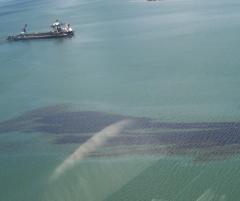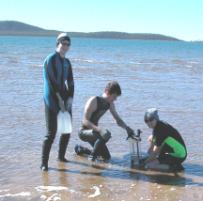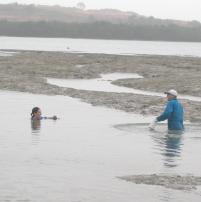Major industrial crisis in Gladstone 'a matter of when not if'
Published on 11 September, 2008
A major industrial crisis in Gladstone is ‘a matter of when not if', even though the port city leads the way in preventative and safety procedures.
With such complex systems involved, multiplied across dozens of industries, it's not possible to be totally crisis-proof.

Oil spills are only one of many risks
It always comes as a sudden shock when confronted by the worst case scenario. Managers or executives will certainly put their best foot forward in responding but are in most cases not prepared either intellectually or emotionally to lead others in an escalating but critical event. The fact is that unthinkable and tragic acts in organisations are occurring with greater frequency than ever before.
A crisis can come at any time; they come at different speeds, via different delivery systems and it doesn't really matter whose watch it is. They can hit hard without warning, grow rapidly and can sometimes last for months, even years.
The Beaconsfield Mine disaster in Tasmania lasted weeks; the rescue was a substantial effort, the media were numerous and the story ran worldwide. Two men were rescued and one man tragically lost his life. The crisis was intense, demanding and took many months to investigate.
The grounding of the Pasha Bulker off Newcastle in June 2007 made headlines around Australia, and it was only after three epic weeks of high seas, snapped cables and leaking oil, that the Pasha Bulker was dragged clear of Nobbys Beach in Newcastle. With nearly 2000 shipping movements per year and a number of groundings already including the recent Endeavour River, and less than a year earlier the Global Peace fiascos, how long is it before we have a major incident in our port?

Monitoring of the harbour
It has been over 10 years but the explosion at the Longford Gas plant in Melbourne still carries implications today. This disaster not only had a loss of life, it caused a large portion of Victorians to be without gas (which meant no hot water or heating throughout winter) for months, cost taxpayers millions of dollars and led to a Royal Commission. With the number of large industries with the potential for similar events to occur in Gladstone, how prepared are our managers?
The Virginia Tech shooting in the United States is one of the worst in US history with over 130 people being killed. How could a lone gunman do so much damage? The ramifications and the role of the crisis response is still being investigated. How do universities communicate with thousands of students in such an urgent event? Does modern technology - SMS, mobile phones and the web provide rapid early warning systems? What do crisis managers have to do to respond and control this kind of event?
One of the world's largest oil companies, BP had its crisis response scrutinised after a massive refinery explosion at Texas City. This was one of the worst industrial explosions in US history where 15 oil workers died and 170 others were injured. There were suggestions that the company failed to protect the health and safety of its workers and that it ignored warning after warning that the worst case scenario could happen. The refinery extends over two square miles on the outskirts of Galveston. The investigation into this crisis has taken over two years and continues. BP stepped-up and admitted responsibility and paid out massive compensation to the survivors and to the families.

Monitoring of the harbour
These a just a few examples of what can go wrong, without any warning. There are sudden crises, smouldering crises, casualty accidents that escalate, environmental accidents that move to catastrophe, crises of mismanagement, workplace violence, plant accidents, financial disasters and transport accidents. Not planning for these problems leaves organisations vulnerable and it is our responsibility to consider how to deflect threats as well as planning to respond to them efficiently.
Every decision that managers make in the first few hours of a crisis carries with it the implications for further escalation. Managers need to not only be able to manage a crisis but be able to lead others. Control can be achieved by taking the high ground and having a manager trained - not only in what to do but also with the ability to lead others effectively during the crisis.
Top corporations and government departments understand that good crisis management leadership is a bottom line issue. They recognise crisis management planning is a cost and reputation saving strategy. They understand that an out of control crisis can cause loss of people, asset damage, law suits, sky rocketing insurance premiums, loss of market share, higher employee turn over and interrupted workflow. Most have some form of Crisis Management plan and training in place - but many do not take the next step and train their managers to be leaders in the event of a crisis.
Crisis management planning and leadership must be part of the overall strategy incorporating rapid response capability into all business functions. CQUniversity is addressing the needs of industry in the region by holding a one-day workshop on October 2 to assist organisations in preparing their managers to be leaders in the event of a crisis situation occurring. This course is designed to develop managers into leaders in the event of a crisis, whether they have previously undertaken any crisis management training or not.

